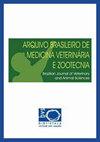Performance and feed preference of weaned piglets fed with corn grain silage subjected to different rehydration sources
IF 0.5
4区 农林科学
Q4 VETERINARY SCIENCES
Arquivo Brasileiro De Medicina Veterinaria E Zootecnia
Pub Date : 2023-06-01
DOI:10.1590/1678-4162-12812
引用次数: 1
Abstract
ABSTRACT The objective of this study was to evaluate the effects of diets composed of corn grain silage rehydrated with water and acid whey on the productive performance and feed preference of weaned piglets. We evaluated 120 piglets weaned in the pre-initial phase I for productive performance, and diarrhea, depression, and thinness states using the following diets: control ration with dry corn grain (CR); and corn grain silage rehydrated with water (CGSR+W); water and inoculant (CGSR+WI); and acid whey (CGSR+AW). To determine feed preference, 20 weaned piglets received reference (CR) and test (CGSR+AW) diets in two phases, restricted and free-choice. Analysis of variance, chi-square test, and t-test were applied at 5% of significance. There were no differences (p>0.05) in growth performance among piglets fed the four experimental diets. Severe thinness and depression were recorded among piglets fed CGSR+W and CR (p<0.05). In the restricted phase, consumption of CGSR+AW resulted in higher daily feed intake (DFI) (p<0.05), while piglets in the free-choice phase showed a higher DFI and spent more time consuming CR, with a 56.39% preference (p<0.05). Rehydrated corn grain silage promoted feed acceptability and performance of piglets in the first weeks post-weaning.不同复水来源对玉米青贮断奶仔猪生产性能及饲料偏好的影响
摘要本研究的目的是评估玉米粒青贮饲料加水和酸乳清复水对断奶仔猪生产性能和饲料偏好的影响。我们使用以下日粮评估了120头在第一阶段断奶前断奶的仔猪的生产性能、腹泻、抑郁和消瘦状态:对照日粮为干玉米粒(CR);玉米青贮饲料(CGSR+W);水和接种剂(CGSR+WI);和酸性乳清(CGSR+AW)。为了确定饲料偏好,20头断奶仔猪接受参考(CR)和试验(CGSR+AW)日粮,分为限制和自由选择两个阶段。方差分析、卡方检验和t检验的显著性为5%。饲喂四种试验日粮的仔猪的生长性能没有差异(p>0.05)。饲喂CGSR+W和CR的仔猪出现严重的消瘦和抑郁症状(p<0.05)。在限制期,消耗CGSR+AW导致日采食量(DFI)增加(p<0.05),而自由选择期的仔猪表现出更高的DFI,消耗CR的时间更长,有56.39%的偏好(p<0.05)。在断奶后的第一周,重新水合的玉米粒青贮饲料提高了仔猪的饲料可接受性和生产性能。
本文章由计算机程序翻译,如有差异,请以英文原文为准。
求助全文
约1分钟内获得全文
求助全文
来源期刊
CiteScore
0.80
自引率
25.00%
发文量
111
审稿时长
9-18 weeks
期刊介绍:
Publica artigos originais de pesquisa sobre temas de medicina veterinária, zootecnia, tecnologia e inspeção de produtos de origem animal e áreas afins relacionadas com a produção animal. Atualmente a revista mantém 628 permutas (419 internacionais e 209 nacionais), sendo um verdadeiro suporte para o recebimento de periódicos pela Biblioteca da Escola.
A partir de 1999, a Escola de Veterinária delegou à FEP MVZ Editora o encargo do gerenciamento e edição de todas suas publicações, inclusive do Arquivo, ficando somente com o apoio logístico (instalações, equipamentos, pessoal etc.). O apoio financeiro é exercido pelo CNPq/FINEP e pela própria FEP MVZ.

 求助内容:
求助内容: 应助结果提醒方式:
应助结果提醒方式:


